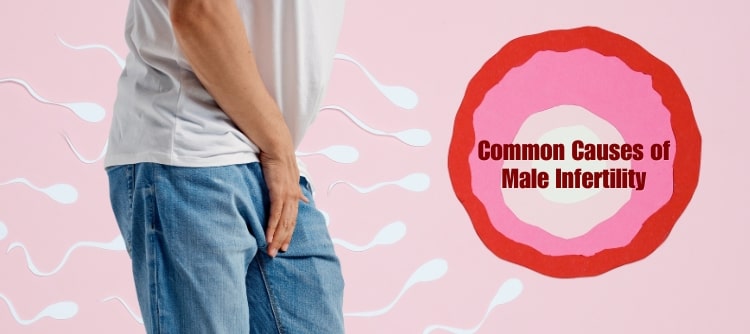Common Causes of Male Infertility

Male infertility is a condition characterized by the inability of a man to impregnate his partner despite regular, unprotected sexual intercourse. It’s a complex issue that affects millions of couples worldwide, causing emotional distress and relationship strain. To shed light on this topic, let’s delve into what male infertility is and its common causes.
What is Male Infertility?
Male infertility refers to the inability of a man to achieve pregnancy in a fertile female partner, typically after a year of unprotected intercourse. This condition can arise due to various factors affecting sperm production, quality, or delivery. While infertility is often perceived as a solely female issue, research shows that male factors contribute to approximately 40-50% of infertility cases. It’s crucial to understand that infertility doesn’t imply a lack of masculinity or virility. Instead, it’s a medical condition that requires proper diagnosis and treatment.
The Most Common Cause of Male Infertility
Several factors can contribute to male infertility, ranging from lifestyle choices to medical conditions. Here are some of the most common causes:
a. Varicocele: Varicocele refers to the swelling of veins within the scrotum, which can lead to reduced sperm quality and production. It’s one of the most common reversible causes of male infertility and often requires surgical intervention.
b. Hormonal Imbalance: Hormonal imbalances, such as low testosterone levels or elevated levels of prolactin, can disrupt sperm production and overall reproductive function. These imbalances may stem from conditions like hypogonadism or thyroid disorders.
c. Genetic Factors: Genetic abnormalities, such as chromosomal disorders like Klinefelter syndrome or Y-chromosome microdeletions, can impact sperm production and quality. These conditions may be hereditary or occur spontaneously.
d. Lifestyle Factors: Lifestyle choices, including smoking, excessive alcohol consumption, drug abuse, and obesity, can negatively affect sperm quality and fertility. Adopting healthier habits can significantly improve reproductive outcomes.
e. Environmental Factors: Exposure to environmental toxins, radiation, or chemicals in the workplace can impair sperm production and function. Minimizing exposure to such hazards can mitigate their impact on fertility.
f. Reproductive Tract Disorders: Conditions affecting the reproductive tract, such as ejaculatory duct obstruction, retrograde ejaculation, or congenital anomalies, can hinder sperm transport and delivery.
g. Erectile Dysfunction: Erectile dysfunction (ED) can interfere with sexual intercourse, making it difficult to achieve conception. Addressing underlying causes of ED and seeking appropriate treatment can improve fertility outcomes.
Who is at Risk for Male Infertility?
Male infertility can affect men of all ages and backgrounds, but certain factors may increase the risk of experiencing fertility issues. Here are some common risk factors:
a. Age: Advanced age can impact sperm quality and quantity, making conception more challenging. While men produce sperm throughout their lives, sperm quality tends to decline with age, particularly after the age of 40.
b. Medical Conditions: Certain medical conditions, such as diabetes, hypertension, or autoimmune disorders, can interfere with reproductive function and contribute to male infertility. Seeking timely management and treatment for these conditions is crucial for preserving fertility.
c. Lifestyle Choices: Unhealthy lifestyle habits, including smoking, excessive alcohol consumption, drug abuse, and sedentary behavior, can negatively impact sperm production and overall fertility. Adopting a healthier lifestyle can mitigate these risks and improve fertility outcomes.
d. Environmental Exposures: Occupational hazards, such as exposure to chemicals, pesticides, or radiation in the workplace, can impair sperm quality and fertility. Minimizing exposure to these environmental toxins is essential for preserving reproductive health.
e. Genetic Factors: Genetic abnormalities or inherited conditions, such as Klinefelter syndrome or cystic fibrosis gene mutations, can affect sperm production and fertility. Genetic counseling and testing may be recommended for individuals with a family history of such conditions.
What are the Symptoms of Male Infertility?
Male infertility often manifests through subtle signs and symptoms that may go unnoticed until couples encounter difficulty conceiving. Here are some common symptoms to be aware of:
a. Changes in Sexual Function: Difficulty achieving or maintaining an erection (erectile dysfunction), premature ejaculation, or reduced libido may indicate underlying fertility issues.
b. Pain or Swelling in the Testicles: Pain, swelling, or discomfort in the testicles or scrotum could be indicative of conditions like varicocele, epididymitis, or testicular torsion, which may impair sperm production or delivery.
c. Abnormal Semen Analysis: A semen analysis revealing abnormalities in sperm count, motility, or morphology suggests potential fertility problems. Consulting a male infertility doctor in Jaipur, Rajasthan, for further evaluation and management is advisable.
d. Hormonal Imbalances: Symptoms of hormonal imbalances, such as decreased facial or body hair, enlarged breast tissue (gynecomastia), or unexplained weight gain, may signal underlying reproductive disorders affecting fertility.
How is Male Infertility Diagnosed?
Diagnosing male infertility typically involves a comprehensive evaluation of both medical history and physical examination, followed by specialized tests to assess reproductive function. Here’s an overview of the diagnostic process:
a. Medical History: The fertility specialist will review your medical history, including any past illnesses, surgeries, or medications that may affect fertility. Discussion of lifestyle factors, such as smoking, alcohol consumption, and occupational exposures, is also essential.
b. Physical Examination: A thorough physical examination, including examination of the genitals and assessment of secondary sexual characteristics, helps identify any anatomical abnormalities or signs of underlying health conditions.
c. Semen Analysis: Semen analysis is a cornerstone diagnostic test for male infertility, evaluating sperm count, motility, morphology, and other parameters. A sample of semen is collected and analyzed in a laboratory to assess sperm quality and function.
d. Hormonal Testing: Blood tests may be performed to measure hormone levels, such as testosterone, follicle-stimulating hormone (FSH), luteinizing hormone (LH), and prolactin, to identify hormonal imbalances that may contribute to infertility.
e. Imaging Studies: In some cases, imaging studies such as scrotal ultrasound may be recommended to visualize the reproductive organs and identify any structural abnormalities, such as varicocele or obstruction of the reproductive tract.
How is Male Infertility Treated?
Once a diagnosis of male infertility is established, the best fertility specialist in Jaipur, Rajasthan, will tailor a treatment plan based on the underlying causes and individual needs. Treatment options may include:
a. Lifestyle Modifications: Adopting healthier lifestyle habits, such as quitting smoking, moderating alcohol intake, maintaining a healthy weight, and reducing stress, can improve sperm quality and overall fertility.
b. Medications: Depending on the specific underlying cause of infertility, medications may be prescribed to address hormonal imbalances, stimulate sperm production, or treat underlying medical conditions.
c. Assisted Reproductive Techniques (ART): In cases where natural conception is not possible, ART procedures such as intrauterine insemination (IUI) or in vitro fertilization (IVF) may be recommended to facilitate conception. These techniques involve the collection, preparation, and placement of sperm directly into the female reproductive tract.
d. Surgical Interventions: Surgical procedures, such as varicocele repair, vasectomy reversal, or sperm retrieval techniques like testicular sperm extraction (TESE) or percutaneous epididymal sperm aspiration (PESA), may be performed to correct anatomical abnormalities or retrieve sperm for ART.
Conclusion
In conclusion, male infertility is a multifaceted issue with various underlying causes, ranging from genetic factors and hormonal imbalances to lifestyle choices and environmental exposures. Timely diagnosis and personalized treatment under the guidance of the fertility specialist are essential for addressing fertility issues and maximizing the chances of conception. By undergoing a thorough diagnostic evaluation, individuals can identify the root cause of infertility and explore tailored treatment options, including lifestyle modifications, medications, assisted reproductive techniques, and surgical interventions. With the support and expertise of male infertility treatment in Jaipur, Rajasthan, individuals and couples can navigate their fertility journey with confidence and optimism, knowing that they have access to comprehensive care and ongoing support towards achieving their dream of parenthood.
